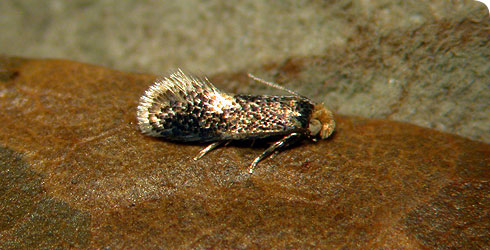Biology
The Ectoedemia heringella larva mines the leaves of evergreen oaks such as Quercus ilex (Holm oak) or Quercus alnifolia Poech.
The eggs are laid on the upper-side of a leaf, often near a vein.
As the larva feeds, it produces a much-contorted gallery mine, almost filled with black frass - debris made up of droppings.
Numerous larvae and mines can be found on a single leaf.
Larvae have been found from November to April but mainly during January or February.
Pupation takes place outside the leaf in a small, ovoid, brown cocoon, either between leaves or in leaf-litter on the ground.
Adults occur from late April to end of June (Nieukerken, 1985). However, moth-trapping at 2 additional sites in London has produced specimens on dates between 4 July and 1 August.
The moth’s flight period in Britain is April to August, possibly in 2 overlapping generations.
Adults have a wingspan of between 4.4 and 5.8mm.
